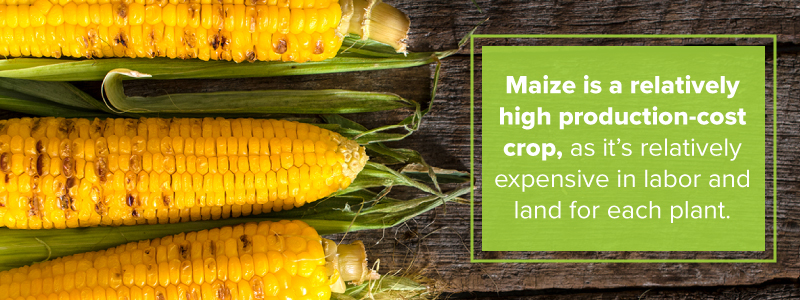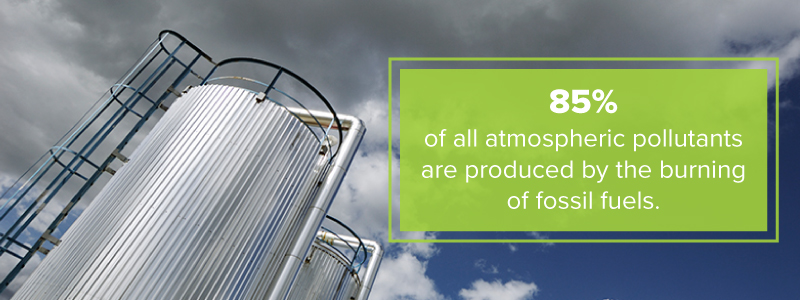Bright Future for the Bio-Based Chemical Industry

In our ever-advancing world, it’s becoming increasingly important to develop and implement sustainable solutions for producing industrial materials. Today, the constant use of petroleum-based products and other non-renewable assets are depleting the world’s natural resources. In addition to the damage caused by this depletion, the use of these natural resources has resulted in serious environmental damage — burning petroleum-based fuels has seriously damaged the Earth’s atmosphere, while petroleum and oil-based plastics have polluted it’s water and disrupted aquatic ecosystems. This damage has prompted many to seek alternative methods for producing industrial materials.
In the past, bio-based chemical products were rarely able to compete with traditional chemical processes and products. However, as technology and chemical methods have improved, the bio-based chemical industry has become increasingly profitable, and is now poised to take over a large share of the market. Sustainability-minded manufacturers and consumers welcome these environmentally friendly alternatives, and as a result, the demand for sustainable chemicals has only been increasing.
In addition to the forward-minded individuals supporting the development of bio-based chemicals, researchers have been developing new sources and applications for bio-based chemicals around the world, producing promising results. Not only do these bio-based chemical supply companies improve the industry — they improve their local economies and environments.
To help you and your company better understand the bio-based chemical industry and the importance of working with sustainable chemical suppliers, we’d like to guide you through the incredible story of the industry, from its history to its current applications and most exciting recent development.
The History of the Bio-Based Chemical Industry
The bio-based chemical industry took its first steps in the 1920s with Henry Ford, who experimented with the idea that ethanol could fuel the automobile instead of gasoline. However, food scarcity was still a real problem at the time, a result of limited agricultural markets. Additionally, there was no federal funding to get Ford’s idea off the ground. The wars of the 20th century further tabled these ideas, placing them on the backburner in favor of established methods. However, the idea remained in the minds of many through the decades, largely dormant until the latter half of the century.
Finally, in the 80’s and 90’s, several organizations began to work toward the development of bio-based production methods and applications for industrial use. Some of these organizations included the New Uses Council and the Alternative Agriculture Research and Commercialization (AARC) Center. These organizations invested in private corporations, funding them as they developed bio-based industrial products, prompting growth in the industry over time.
True focus on bio-based chemical production methods did not come until the turn of the millennium, however, when concerns about finding new sources for oil and other nonrenewable resources came back to the forefront of public concern. It was at this point the National Research Council provided scientific proof for the concept of the bio-based industry, proposing numerous advantages the industry could provide the United States if pursued.
Bio-Based Chemical Applications
When many consider of bio-based chemicals, they think of ethanol-based fuel, as Ford did. However, the applications of bio-based chemicals reach far beyond energy. Some of the applications of bio-based chemicals include the following:
- Energy: The largest opportunity for the bio-based economy is in energy and liquid fuels. Most promising and well known of these applications are ethanol and biodiesel. This fuel is made by extracting fatty acids and oils from the starch of maize plants. The byproducts of this process are only animal feed and hot water, so the production of this fuel does not let off toxic chemicals like petroleum refineries do. However, maize-produced ethanol does not come without its problems.
- Maize is a relatively high production-cost crop, as it’s relatively expensive in labor and land for each plant. Additionally, the production of ethanol from this maize has resulted in an excessive amount of animal feed byproduct on the market. For these reasons, maize is likely not a viable long-term solution. Researchers are currently looking for an alternative method, one with fewer byproducts and better cost-per-plant.

- Chemicals: Numerous bio-based chemicals feature in hundreds of products on the market today. Many are intermediates or significant ingredients in food, pharmaceuticals and cosmetics. These chemicals can also produce natural oils and lubricants, as well as cleaners, solvents, adhesives and industrial gums and paints.
- These bio-based chemicals are often more expensive than their traditional equivalents, but pose a valuable, renewable alternative, and one that is highly appreciated among chemical companies throughout the world.
- Materials: While numerous materials are primarily bio-based, such as lumber, cotton and silk, there are additional sustainable fiber sources available for use. Flax, industrial hemp, milkweed floss and other materials each have their own unique features that make them useful both by themselves and as parts of fiber blends. Additionally, more rigid materials like wheat straw are often used in buildings and furniture as particleboard. Other alternative materials include hemp-based plastics, which are on the rise as packaging alternatives, and even pineapple-based leather.
All of these applications are constantly being researched and expanded worldwide, resulting in new discoveries with each passing year. These developments not only mean improved sustainability within the United States, but new applications, industries and markets throughout the world.
The Benefits of the Bio-Based Industry
The numerous applications of bio-based chemicals are only growing in recent years as public attention turns towards sustainability. However, sustainability is far from the only benefit offered by using bio-based products. Some of the benefits of bio-based products include, but are not limited to, the following:
- Environmental Benefits: Minimizing chemical waste and the release of toxic byproducts into the environment is one of the most important benefits of sustainable bio-based chemical products. 85% of all atmospheric pollutants are produced by the burning of fossil fuels, while 275 million tons of plastic waste are produced each year worldwide, 8 million tons of which end up in the ocean. Both of these side effects pollute the environment and negatively impact wildlife throughout the world.

- A worldwide switch to bio-based products can mitigate these problems, in combination with proper recycling and disposal of potentially harmful products. Bio-based fuel lets off minimal atmospheric pollutants, while bio-based plastics degrade more quickly than traditional plastics, reducing the impact of plastic waste on wildlife.
- Economic Independence: Bio-based fuels are a point of interest for many corporations and states, primarily due to the economic independence they offer. Foreign petroleum accounts for a large portion of the United States’ oil, leaving the nation dependent. A switch to locally produced liquid fuels, such as ethanol, will help the nation attain relative energy independence.
- More Jobs: The bio-based chemical industry is on the rise, replacing the jobs left by traditional chemical plant positions and more. Additionally, farmers growing the sources of these bio-based materials will experience improved farm revenues, revitalizing the United States’ rural communities.
- Reduced Expenses: Bio-chemicals require less special handling and management than traditional, more hazardous chemicals, reducing operating expenses and increasing revenue. Additionally, disposal of waste is much less problematic, as the byproducts of bio-based chemicals are non-toxic and repurposable, usually as animal feed.
These incredible benefits of sustainable bio-based chemicals have resulted in many chemical corporations looking into these options for their own products.
The Growing Market for Green Chemistry
The global market for sustainable, “green” chemistry is positioned to grow phenomenally in the next few years. Public interest in sustainable chemistry is on the rise, with 62% of chemical companies reporting customer interest in sustainable applications in 2014 — a 5% rise since 2009. This interest, on top of the growing number of companies expressing interest or intent to take part in green chemistry, has led to a very promising outlook for the global market for green chemistry. Many expect the global green chemistry market to experience substantial boom, rising from $11 billion in 2015 to nearly $100 billion by 2020.
Included in these projections are bio-based chemistry applications and procedures, which have come to the forefront of national attention several times over the past few years for their incredible applications and positive effects on the local economy and environment. One promising example of this is the Sardinian thistle.
Sardinian Thistle Bio-Products
Since the autumn of 2011, Sardinia has been working on bio-based chemistry products made from a local plant species known as the cardoon. The cardoon is a thistle-like plant closely related to the artichoke and actively grown in Porto Torres in northern Sardinia. This herbaceous perennial species originates from the Mediterranean area, and is perfectly suited to warm, dry climates, meaning it takes very little water and care to maintain.
This humble thistle produces seeds with excellent quality oil, a perfect building block for numerous bio-based products like bio-chemicals, bio-intermediates, bases for lubricants and bio-additives for rubbers. Currently, the most popular use for this thistle oil is in the production of bioplastics.
One of the most attractive aspects of using these cardoons, however, is how they have helped to repurpose the local land. Biofuels are often criticized for reducing the amount of crops available for food, or for taking over land meant for agriculture. However, the thistles grown in northern Sardinia do not compete with the local agriculture at all. In fact, of the 60 thousand hectares of wheat-growing land abandoned in the past three decades, farmers have reclaimed about four percent for growing cardoons, which are much cheaper to grow and provide a larger income margin.
In addition to reclaiming land, the Sardinian thistle oil manufacturing process has also revitalized a major local industry.
Manufacturing with Thistle Oil
The thistle oil manufacturing process takes place in the new Matrìca plant, built on the site of a previously abandoned petrochemical plant. Now, machines and silos that used to work on petrol refinement and storage now work to produce bioplastics.
A basic overview of the process goes as follows:
- Extraction: After extracting the oil from the thistle seeds, the leaves, stem and other parts of the thistle are burnt as fuel for the factory. The remaining parts of the seeds are converted into animal feed for the local livestock.
- Mixing: The thistle oil is then mixed with sunflower oil, which serves as the base ingredient for the products developed. At this stage, researchers analyze the quality of the oil to assess whether it’s ready to continue the process.
- Conversion: Four completely automated reactors then convert the vegetable oil into acids. These acids are the raw materials for bioplastics, biochemicals and other products.
From these acids, this company produces a number of bio-based products, used in a variety of ways.
The Uses of Thistle Oil
The products of the thistle oil conversion process include raw materials used as intermediaries in the production of several final products. Some of these include the following:
- Bioplastics: These plastics are often used for grocery bags, bottles, and other packaging materials.
- Bio-herbicides: Bio-chemicals for killing weeds can replace toxic molecules that pose a danger to the environment.
- Bio-lubricants: Manufacturers can make several bio-lubricants with thistle oil, including one specifically made for ships. This ship bio-lubricant is non-polluting and dissolves in the sea, a boon to the ocean’s ecosystem. Europe alone produces 3 million tons of lubricating oil made from petrol that ends up in the ocean each year. Instead of these ecologically damaging pollutants, bio-lubricants decompose naturally, resulting in minimal impact on aquatic ecosystems.
Manufacturers convert thistle oil into numerous products beyond these three, but these are the primary products created with Sardinian thistle oil. These exports, as well as the thistle plant itself, have resulted in several positive economic outcomes in Sardinia.
The Effect of Thistle Oil on the Porto Torres Economy
The new Matrìca plant in Porto Torres has been important for local employment, providing over 200 jobs during the construction and remodeling of the plant and over 680 upon opening, mostly to graduates of the local colleges. By using previously abandoned land, they’ve also provided better jobs for local farmers and growers, with a product that provides a greater profit margin than wheat.
Thistle oil production has also positively affected other production chains in Porto Torres, primarily the livestock, milk and honey trades. The protein-rich flour produced as a by-product of the thistle-seed oil extraction process serves as a quality animal feed, which helps livestock develop quality meat and milk, while thistles also produce excellent quality nectar to support healthy local beehives. These production lines have served to positively impact one another positively over the past few years, demonstrating yet another encouraging aspect of bio-based chemistry.
Though their products are more expensive to buy than those produced by more traditional methods, this thistle-based manufacturing plant in Porto Torres has successfully stimulated the local economy and drawn the eyes of researchers around the world to the incredible benefits of bio-based manufacturing.
Acme-Hardesty and Sustainability
Bio-based products have been the focus of Acme-Hardesty for over 70 years. We constantly strive to meet the growing demand for sustainable and renewable bio-based chemicals, while simultaneously educating our staff and clients on the most recent news in the bio-based chemical industry.
To learn more about sustainable bio-based products or about Acme-Hardesty, contact us today to speak with one of our experienced team members.


